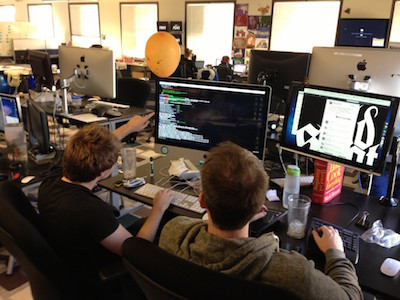
via Flickr user Cristiano Betta
Right now, at this very moment, you’re reading this article on an electronic device, connected to the internet, none of which would be possible were it not for computer science. Now such an integral part of so many of modern daily life, from text messages to international trade, jobs in computer science-related fields are growing, innovative, and often well-paying. If you’ve always felt comfortable around computers, enjoy using technology in all of its many forms (while finding flaws in and hoping to innovate the technological systems you already use), and have found yourself the unwitting technical support representative to those around you, you might just be a perfect fit for a career in a computer science-related field.
In the 2010-11 academic year, about 43,000 computer science degrees were granted of the total 1.7 million or so, bringing the computer science major in at around 2% of the total degrees granted.
Compensation for computer science graduates is, on average, higher than most other disciplines, with tech-related jobs paying around 9% more than other industries that graduates find themselves in. In addition, due to the nature of the work and the direct correlation between skills learned in school and applied, most computer science majors enter into an industry related to their field.
The computer science major at the University of Illinois has found that the average starting salaries for Bachelors of Science graduates is $68,650.
As a computer science major, you’ve likely spent more hours than you’d care to tabulate planted firmly in front of a computer monitor. You’ve written lines and lines of code only to have one comma ruin the entire script. It’s been frustrating at times, I’m sure, but also highly rewarding in the sense that you’ve now become familiar and fluent in programming languages, the foundational building blocks of software.
These programming languages rely on logic. They’re systems, and they work according to a very specific set of rules. Understanding and being able to operate within these rules is a marketable skill of computer science majors. Similarly required and honed is an attention to detail necessary to most technology-related endevours. While modern technology, hardware, and software are incredible powerful tools on a number of different fronts, from graphics production to animation and sound engineering, their efficacy lies on a razor’s edge. They work because of well-versed computer scientists who understand that one misplaced digit can be disastrous in programming.
Most computer science majors require at least a few mathematics courses, if not higher-level advanced mathematics classes. Computer science courses often involve proofs, mathematics and logic. Most programming languages have associated mathematical concepts and formalism that must be deeply understood in order to program efficiently.
While the fundamental concepts of computer science are mathematics and coding – disciplines not too often thought of as particularly “creative”, there is indeed a certain amount of creative thinking and ingenuity that is necessary to be a successful computer science major.
Software Developer
Median Pay: $90,000
This is a fairly broad category of employment and is generally broken down into systems and application software development. Whether designing a new iOS or Android app, or working to create a powerful suite of business software to run on a PC, software developers program the electronics we use everyday. In essence, without software developers, computers would be little more than hunks of metal and plastic. Working in software development, a computer science major would be implementing the knowledge of programming language in order to build software. The process often begins with flowcharts and design parameters before being coded either by the developers themselves or a dedicated programming staff.

via Wikimedia Commons
Web Development
Median Pay: $82,000
The ubiquitousness and reach of the internet is a given in today’s world. The Millennial generation has been found to spend almost 40 hours per week on the internet, a broader age range clocking in at around 30 hours per week. While we use it so often, many of us take for granted the websites we visit themselves as domains that are bought, designed, built, and maintained. Web developers are the engineers behind these processes, starting with theoretical concepts for potential websites, writing code to provide functionality, and employing the help of designers and layout specialists to create a finished product that will appeal to potentially millions of visitors per month. Computer science majors are usually the best candidates for these positions, due to their familiarity with the software tools involved, knowledge of programming languages such as HTML, and a general understanding of design principles. Even better, jobs in web development are often well-paying and growing faster than normal, making web development a sensible and potentially lucrative career path for those qualified and interested.
Technical Support & IT
Median Pay: $72,000
While computers are designed to be somewhat user-friendly, we’ve all been at that point where something has gone wrong and we just cannot figure it out. While – and this is some sage advice – Google is one of your best friends when it comes to solving computer-related issues, often troubleshooting electronic-related issues requires more than advice from a random forum post buried somewhere in Internet. Therein comes the sometimes under-appreciated but crucial role of those who work in Tech Support. Jobs in Tech Support and IT can range from small-scale businesses and personal support to positions in multinational corporations who would likely fall apart without a dedicated staff to make sure their computer systems are running smoothly. These positions will require knowledge of programming languages as well as an understanding of computer hardware and network systems.
While you’ve likely graduated with a well-developed understanding of at least one programming language, it essentially holds true that the more you know, the better. These language might include Java, C++, HTML, and others. In addition, the more software platforms you can operate effectively, the more attractive of a potential candidate you are – being able to use Mac, Linux, and Windows platforms all with a high degree of efficiency is a highly marketable skill.
If you’re interested in pursing web development and design as a career, it wouldn’t be a bad idea to brush up and gain, at the very least, a basic understanding of visual design elements to help in your construction of websites. While you might be more behind-the-scenes as opposed to designing layout, an understanding of these principles certainly isn’t bad to have, especially if you’d like to eventually be able to build websites from the ground up.
| Computer Science Assignment Grader (Contract)Remote India Study.com C Columbus, OH | View |
| Artificial Intelligence Engineer ACL Digital Columbus, OH | View |
| Information Technology Specialist SOSI Columbus, OH | View |
| Data Analyst Jiffy Limited Columbus, OH | View |
| Software Engineer [Multiple Positions Available] JPMorgan Chase & Columbus, OH | View |
| IT Solutions Engineer (Remote - United States) Hexagon AB Columbus, OH | View |
| Staff Software Systems Engineer, Behavior Validation General Motors Columbus, OH | View |
| Data Scientist Inspyr Solutions Columbus, OH | View |
| Technical Solution Engineer Pyramid Consulting Columbus, OH | View |
| Entry-Level Vulnerability Researcher - Hybrid/Remote Battelle Memorial Institute Columbus, OH | View |